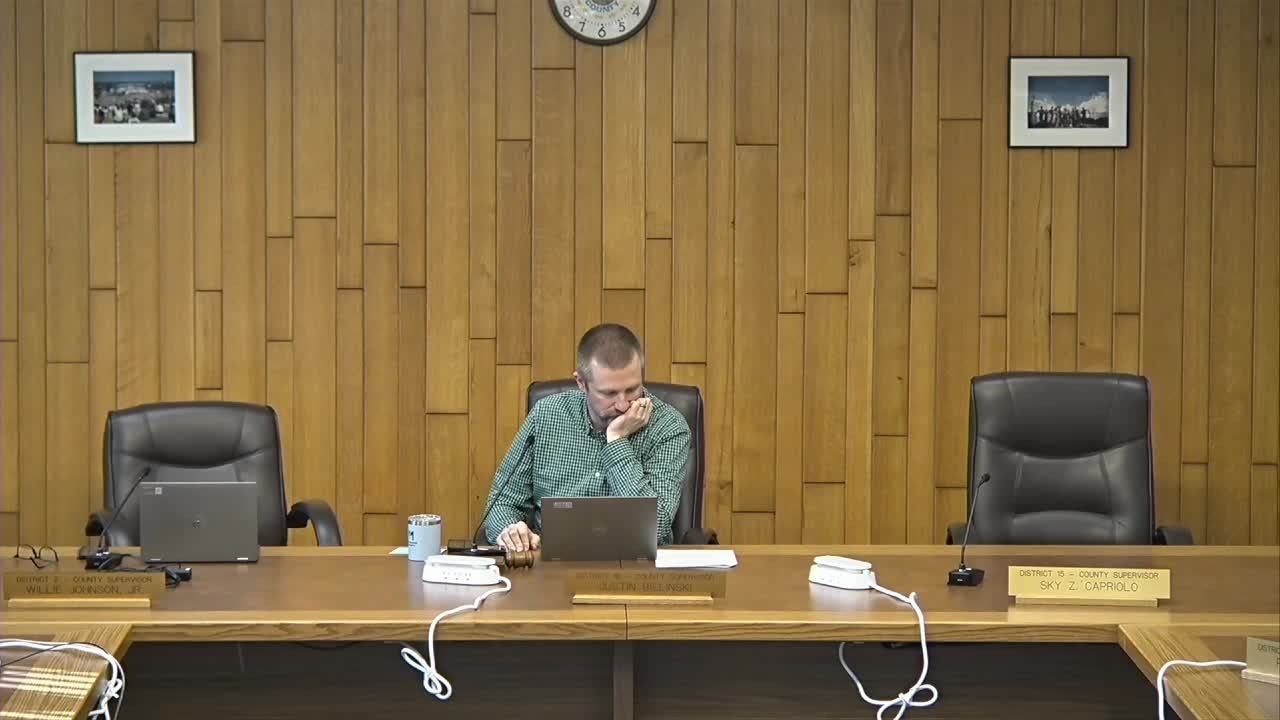Sheriff's office seeks 3-year amendment with IC Solutions; committee hears concerns over 15‑minute video blocks and funding
Get AI-powered insights, summaries, and transcripts
Subscribe
Summary
The Milwaukee County Sheriff’s Office presented a proposed three‑year amendment with Inmate Calling Solutions LLC to provide phone and video services at county correctional facilities under new FCC rate caps and proposed an allotment of up to 90 free phone minutes and 15 free video minutes per week.
The Milwaukee County Sheriff’s Office asked the committee to note a proposed three‑year amendment with Inmate Calling Solutions LLC (IC Solutions) to provide phone and video calling services at the Milwaukee County Jail and the Community Reintegration Center for the period March 29, 2025, through March 28, 2028.
Director Joshua Briggs told the committee the amendment responds to a July 28 Federal Communications Commission ruling that set rate caps for calling: 6¢ per minute for phone calls and 11¢ per minute for video visitation. Briggs said the county’s 2024 adopted budget eliminated commissions from phone and video revenue and that the executive proposed a program to provide free minutes. Under the amendment presented, the county would provide up to 90 free minutes of phone calls and 15 free minutes of video visitation per week per person in custody. Briggs said the amendment includes funding to reimburse one deputy sheriff position to provide on‑site administration for the communications system; the fiscal amount for that position was stated in committee as roughly $100,000.
Briggs said the county does not expect to receive commission revenue under the amendment; the agreement provides a fee‑for‑service structure under which IC Solutions would receive the capped per‑minute payments from callers after the free allotment is used. He said the county’s fiscal 2024 budget had already removed prior commissions and that the amendment itself has no additional base contract fee.
Committee members pressed several operational and policy questions. Supervisor Logsdon asked whether the change would require extra work from correctional officers; Briggs said he did not expect a change to officer labor but acknowledged the lower rates and free minutes could increase call volume. Chair Balinski and other supervisors questioned why the county would rely on an outside vendor rather than internal VoIP or existing county platforms and asked whether monitoring could be provided in‑house. Briggs responded that the vendor solution is set up to provide required monitoring functions and operational oversight of calls and visitation booths.
Several supervisors raised concerns about the amendment’s switch from a monthly allocation to weekly blocks, and whether breaking video visitation into 15‑minute blocks would disadvantage people who plan for longer, single sessions with family. Briggs said county staff adopted weekly blocks because of implementation complexity: people are booked into custody at varying times, and weekly allotments were easier to administer so that a person coming in late in the month would not require prorated monthly minutes. Briggs also said the free minutes do not roll over week to week.
A public commenter, Ron Jansen, urged the committee to oppose the change when it reaches finance, saying the county had previously approved 60‑minute video blocks and that converting them to 15‑minute segments risks undermining the spirit of that action. Jansen also argued the change could benefit private vendors and recalled earlier proposals discussed in which a nonprofit would have provided unlimited free calling and left equipment to the county. Supervisor Johnson Jr. urged members on the finance committee to scrutinize the amendment and any fiscal impacts when the file is considered by finance.
Deputy corporation counsel Karen Tidwell said the corporation counsel’s office would continue to monitor federal changes and examine whether the FCC rules specify minute‑block requirements; she offered to review the amendment’s contractual and operational details and report back to the committee.
Committee members were reminded the item was before this committee for informational purposes only; finance will take formal action on the contract. No final contract vote was taken by the committee during the session.
